
The Slovenian Democratic Party, formerly the Social Democratic Party of Slovenia, is a conservative parliamentary party; it is also one of the largest parties in Slovenia, with approximately 30,000 reported members in 2013.
Same-sex marriage has been legal in Slovenia since 9 July 2022 in accordance with a ruling from the Constitutional Court of Slovenia. The court had ruled that the ban on same-sex marriages violated the Constitution of Slovenia and gave the Parliament six months to amend the law to align with the ruling, although the decision took effect immediately after publication. The National Assembly passed legislation to align with the court ruling on 4 October 2022, which was vetoed by the National Council one week later, but the veto was then overridden by the National Assembly on 18 October 2022.

Lesbian, gay, bisexual, transgender, and queer (LGBTQ) rights in Slovenia have significantly evolved over time, and are considered among the most advanced of the former communist countries. Slovenia was the first post-communist country to have legalised same-sex marriage, and anti-discrimination laws regarding sexual orientation and gender identity have existed nationwide since 2016.

Presidential elections were held in Slovenia in October and November 2007 to elect the successor to Janez Drnovšek. France Cukjati, the President of the National Assembly, called the elections on 20 June 2007.
A referendum on minority rights was held in Slovenia on 4 April 2004. Voters were asked whether they approved government proposals to restore basic rights to ethnic minorities who had been erased from the citizen registry in 1992. The proposal was rejected by 96% of voters, with a voter turnout of 32%.

Parliamentary elections were held in Slovenia on 4 December 2011 to elect the 90 deputies of the National Assembly. This was the first early election in Slovenia's history. The election was surprisingly won by the center-left Positive Slovenia party, led by Zoran Janković. However, he failed to be elected as the new prime minister in the National Assembly, and the new government was instead formed by a right-leaning coalition of five parties, led by Janez Janša, the president of the second-placed Slovenian Democratic Party. The voter turnout was 65.60%.
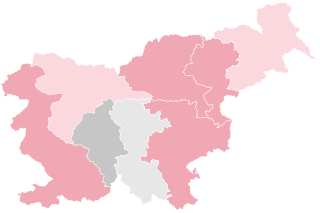
Presidential elections were held in Slovenia on 11 November 2012, with a run-off held on 2 December. Slovenia's 1.7 million registered voters chose between the incumbent president Danilo Türk, the SDS/NSi party candidate Milan Zver and Borut Pahor of the Social Democrats who was also supported by the Civic List. The first round was won, contrary to the opinion poll predictions, by Pahor, with Türk placing second. In the run-off election, Pahor won with roughly two-thirds of the vote.

Parliamentary elections were held in Slovenia on 13 July 2014 to elect the 90 deputies of the National Assembly. The early election, less than three years after the previous one, was called following the resignation of Alenka Bratušek's government in May. Seventeen parties participated, including seven new parties, some of which formed only months before the election took place. Party of Miro Cerar (SMC), a new party led by lawyer and professor Miro Cerar, won the election with over 34% of the vote and 36 seats. Seven political parties won seats in the National Assembly. Three political parties left the Assembly, including Zoran Janković's Positive Slovenia, the winner of the 2011 election, and the Slovenian People's Party, which failed to win a seat for the first time since the first elections in 1990. A leftist United Left party entered the Assembly for the first time, winning six seats.

A referendum on a bill legalising same-sex marriage was held in Slovenia on 20 December 2015. The bill was rejected, as a majority of voters voted against and the votes against were more than 20% of registered voters.
In the run up to the 2018 Slovenian parliamentary election, various organisations carry out opinion polling to gauge voting intention in Slovenia. Results of such polls are displayed in this article.

Presidential elections were held in Slovenia on 22 October 2017. Nine candidates ran in the first round of the elections, in which the incumbent independent President Borut Pahor placed first and Marjan Šarec of the List of Marjan Šarec (LMŠ) placed second. No candidate received a majority of the vote in the first round, resulting in a run-off between Pahor and that was held on 12 November 2017. Pahor won the run-off with 53% of the vote; voter turnout in the second round was 42.13%, the lowest in any presidential election since independence.
A referendum on a law governing the Divača-Koper rail upgrade was held in Slovenia on 24 September 2017. The referendum was marked by a low turnout; a majority of voters voted in favour of the proposed law. The results were annulled by the Supreme Court in March 2018, resulting in a new referendum being held in 13 May 2018.
In the run up to the 2022 Slovenian parliamentary election, various organizations carried out opinion polling to gauge voting intention in Slovenia. Results of such polls are displayed in this article. The date range for these opinion polls are from the 2018 Slovenian parliamentary election, held on 3 June, to the present day. The next parliamentary election was held on 24 April 2022.
A referendum on a law governing the Divača-Koper rail upgrade was held in Slovenia on 13 May 2018. It followed the annulment of the results of a 2017 referendum on the same subject by the Supreme Court in March 2018. The result saw just 309 more votes cast against the law (50.06%) than in favour (49.94%). Voter turnout was even lower than in 2017, at around 15%, meaning that the requirement of 20% of the electorate casting a "no" vote to validate the referendum outcome was not met. As a result, the law remained in force.
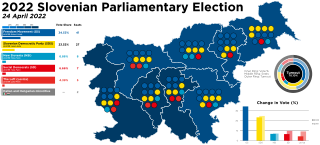
Parliamentary elections were held in Slovenia on 24 April 2022 to elect all 90 members of the National Assembly.
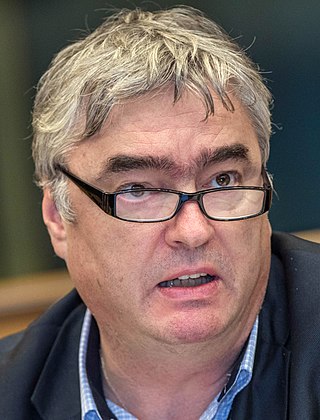
2019 European Parliament elections were held in Slovenia on 26 May 2019.
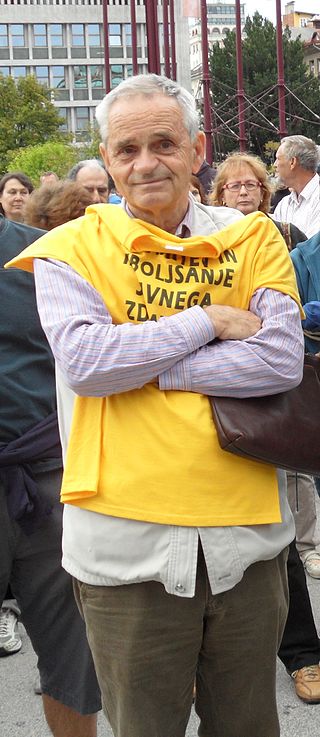
Vili Kovačič is a Slovenian impact litigation activist and blogger, who was the first in Europe to successfully challenge a referendum result based on a campaign finance violation. His challenge resulted in the resignation of Prime Minister Miro Cerar and early parliamentary elections in 2018. His successful challenges to elections and referendums resulted in Constitutional Court reforming Slovenian electoral laws and practices.

Andrej Vizjak is a Slovenian politician. Between 2004 and 2008 he served as Minister of Economy in the 8th Government of Slovenia, and between 2012 and 2013 as Minister of Labour, Family and Social Affairs in the 10th Government of Slovenia. From 2020 to 2022 he was Minister of the Environment and Spatial Planning in the 14th Government of Slovenia.
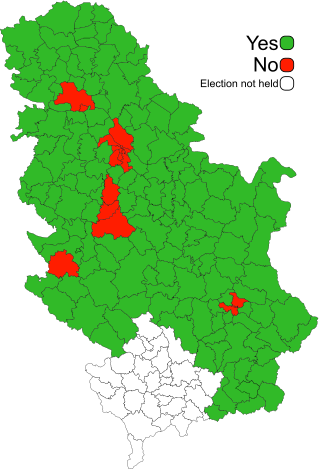
A constitutional referendum was held in Serbia on 16 January 2022, in which voters decided on changing the Constitution in the part related to the judiciary.
In the run-up to the next Slovenian parliamentary election, various organisations carry out opinion polling to gauge voting intention in Slovenia. Results of such polls are displayed in this article.













